Gentile travelers, beware! In Israel, just about everything closes for shabbat. From sundown on Friday, until sunset on Saturday, nearly the whole country goes on holy hiatus, including government offices, shops, restaurants, museums … and even soup kitchens.
This last surprised me most, as I stood outside a free restaurant in Tsfat, a small town to the north that’s located atop Israel’s third-highest peak. On my way from Tiberias to Jerusalem, I’d made a side trip to this mountain village, which is a center for Jewish mysticism, and study of the Kabbalah. As I wandered about, I’d discovered Beth Hiabsil (or, “House of Eat.”), a free restaurant which is mostly patronized by Tsfat’s elderly citizens. A sign outside proclaimed it was funded by a grant from The Conference on Jewish Material Claims Against Germany.
I was curious to find out more about the Claims Conference, but this research would have to wait, as my visit to Beth Hiabsil was on a Saturday morning, midway through shabbat, and the place was locked up tight. Jotting down the address, I noted this soup kitchen was adjacent to the Beirav Carlebach Synagogue on Meginei Street.
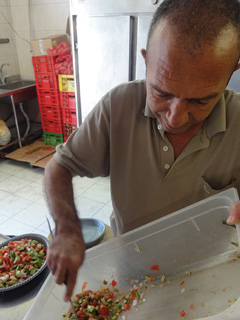 My face turned towards my notebook, I was startled to hear a voice behind me. “Tsfat is like a big circle. No matter where you start, you’ll end up coming back to the same place.”
My face turned towards my notebook, I was startled to hear a voice behind me. “Tsfat is like a big circle. No matter where you start, you’ll end up coming back to the same place.”
When I turned around, I saw a bearded man in his mid-fifties. He was smiling. As we shook hands, he told me his name was Irving Ginsberg. “It’s spelled like Alan Ginsberg,” he said. “You’ve maybe heard of Alan Ginsberg, the great American poet?”
I agreed that I had.
In short order, it was established that Irving Ginsberg grew up on the Upper West Side of New York City, but is now the cantor/ spiritual leader of the Beirav Carlebach Synagogue. He pointedly demurred, though, from calling himself rabbi. Shlomo Carlebach has been dead for many years, but Ginsberg hinted, without exactly spelling it out, that through his ministrations at services, and prayers of the faithful, Carlebach’s spirit returns each shabbat. Thus, Ginsberg still considers Shlomo Carlebach to be this synogogue’s official rabbi.
“In Judaism,” Ginsberg begins, “to share something
you have with the needy is not, it is not, a question of
yes or no. It is a must!”
Intrigued by all this, I ask Ginsberg if he has a moment for a quick question.
“I have two moments! I have many more than two! Come into my office. Come! Come!” Ginsberg is practically shouting his welcome as he unlocks the temple, and insists I pass through the door before him.
We sit in his office and I describe my gastrophilanthropy project, explaining that I’m trying to find out what might be distinctive about soup kitchens in Israel. I’m curious to learn more about the Claims Conference, too. But first, can he tell me something about Talmudic tradition, when it comes to charity?
“In Judaism,” Ginsberg begins, “to share something you have with the needy is not, it is not, a question of yes or no. It is a must!”
This custom originates with the Hebrew Scriptures. In several passages in the Torah, God commands the Jewish people to perform acts of tzedakah (pronounced tseh-DUH-kuh), which is the Hebrew word for “justice” or “righteous behavior.” This definition, however, somehow misses the mark, as charity is typically understood to be a spontaneous act of good will that’s indicative of the giver’s special generosity. In Judaism, Ginsberg explains, tzedakah is no whim, but an obligation. Doing what is right towards the poor and hungry
is a central part of being a good Jew.
“If you have something, you must share it!” Ginsberg cries, his voice again getting
quite loud. “God says, ‘If you are rich, it’s only because I gave this to you. If you give
it back to others, you prove to me I was correct to have entrusted it to you in the first
place. If you don’t….”
“If you give, and give big, you will be greatly blessed. People recognize you for your generosity. There are worse things to be known for, right?”
Ginsberg raises his hands, palm up, and makes a dramatic shrug. “Well, money comes, and money goes.”
He leaned back in his chair, and smiled. “So, Jews must give, but this is all within reason. If you make 3,000 dollars a month, you can’t give away 4,000. Obviously! So, a good rule of thumb is you are supposed to give 5% from the profit. Pay your expenses. Take care of your family. But what’s left over? Give 5% of this to the poor and needy.”
In my Baptist upbringing, it was always taught you were supposed to tithe 10% of your salary (meaning, the “gross”), not 5% of the profit (or, “net”). As if he’s read my mind as I calculate all this, Ginsberg continues speaking.
“In addition to that, though, charity is something Jews are commanded to do every day. You can always find someone who needs something, even if it’s as little as a dollar, or a dime, or it does not have to be money! Maybe it’s a box of pasta, or an old pair of shoes. We are to make ourselves ever aware of needs around us, and seek to do something about them, every day. If, in the unlikely circumstance that you don’t run into someone who needs your assistance on any given day, however, there is always the pushke!”
The what?
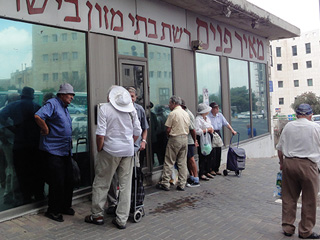 He explained that “pushke” (pronounced PUSH-kee, PUSH-kuh, or PISH-kee) is a Yiddish word, derived from Polish, and it means a little can or container kept in the home, often in the kitchen, in which loose change is deposited. When your pushke is full, you give this money away to a charitable cause. Hearing this, I suspect that the “March of Dimes,” started by FDR in the 1940’s to fight polio, was an appropriation of this Jewish notion to fill little tins with coins.
He explained that “pushke” (pronounced PUSH-kee, PUSH-kuh, or PISH-kee) is a Yiddish word, derived from Polish, and it means a little can or container kept in the home, often in the kitchen, in which loose change is deposited. When your pushke is full, you give this money away to a charitable cause. Hearing this, I suspect that the “March of Dimes,” started by FDR in the 1940’s to fight polio, was an appropriation of this Jewish notion to fill little tins with coins.
I mention my earlier conversation with Rabbi Kalmonfsky, and his idea of the “Charity Police” who could simply demand money from the more well-off citizens to be given to the needy. Irving Ginsberg takes some exception to this.
“It’s not so much the giving was forced. Or, at least it’s certainly not that way now. It’s something rather more like, if you give, and give big, you will be greatly blessed. You get a better seat at the shul. People recognize you for your generosity. There are worse things to be known for, right?”
Indeed.
After bidding Ginsberg farewell, I went directly from his office to a store in Tsfat that sold Judaica. I bought two pushke, one for my office, and the other for my bedside table at home. From now on, I decide, all my pennies, nickels, dimes and quarters, will be collected in these boxes and donated to charitable causes. I notice my new pushke have tiny padlocks — presumably to prevent anyone (me?) poaching from the poor.
Driving on to Jerusalem, I think more about my chat with Irving Ginsberg. Among other things, he’d explained that the mission of the Claims Conference was to secure some measure of justice for Jewish victims of Nazi persecution, through a combination of negotiations, disbursing funds to individuals and organizations, and seeking the return of Jewish property lost during the Holocaust. Since 1952, the German government has paid more than $70 billion in indemnification for suffering and losses resulting from Nazi persecution. A percentage of this total has gone towards the creation and maintenance of senior centers, and soup kitchens to feed the hungry.
This seems just desserts, I think. Then, I worry that, under the circumstances, this pun is unforgivable.
Jerusalem’s Meir Panim free restaurant is located on Hatzvi Street, nearly in the shadow of the city’s Central Bus Station. Traffic in this part of town is fierce and frenetic, as buses arrive into the country’s capital every few minutes from all over Israel.
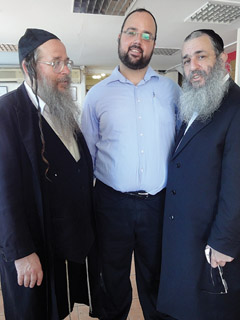 A few young men, who look nearly identical in age and demeanor to those I’d seen up in Tiberias, are mopping the floor as I enter the restaurant. Others are hoisting about tables and chairs. All are amusing themselves as they go about their work, by singing, in phonetic English, the cadences of the U.S. Navy marching song, “…I don’t know, but I’ve been told: Navy wings are made of gold…”
A few young men, who look nearly identical in age and demeanor to those I’d seen up in Tiberias, are mopping the floor as I enter the restaurant. Others are hoisting about tables and chairs. All are amusing themselves as they go about their work, by singing, in phonetic English, the cadences of the U.S. Navy marching song, “…I don’t know, but I’ve been told: Navy wings are made of gold…”
I approach a couple of these workers, and ask for the manager of this soup kitchen. “Excuse me. Is Aryeh here?” They look at me for a moment, and then burst into laughter. Rather than answer, they repeat some of what I just said, continuing to practice their English.
“Egg-scooze me!”
“Ek-coose me!”
I am embarrassed, but realize it will only make things more awkward if I appear bothered by this slight mockery. I smile, back away, and go sit at one of the empty tables. I am a few minutes early for an appointment to meet with a man named David (“Dudi”) Roth, who is the national director of all Meir Panim soup kitchens in Israel.
Gazing about, I see a great many signs posted on the walls, announcing benefactors.
“Meir Panim is generously supported by the Iranian-American Jewish Federation of New York.” Or, “Frances Frymet (Auschwitz Survivor) in memory of her family who perished
in Treblinka, and her friend, Rosa Robate, who perished a martyr in Auschwitz.” Or, “250 meals at Meir Panim Free Restaurant were generously contributed by the Jewish Community Foundation of Los Angeles, California.” And dozens more, worded similarly
to these.
So many tzedehahs, for just one soup kitchen!
Only now do I notice a man sitting at a table in one corner of the restaurant. I guess he must be a probation officer, checking up on these young lawbreakers who are working off their sentences. When I attempt to photograph some of the benefactor signs on the wall, he mistakenly thinks I am trying to snap his picture. The officer jumps up from his seat and waves me off vehemently. He is equally humorless and brusque with the boys. As one after another sit before him, the officer scowls mightily, doing his best to demonstrate how very, very serious he is about his job. While they talk, he makes notes on a legal pad, and occasionally checks his Blackberry.
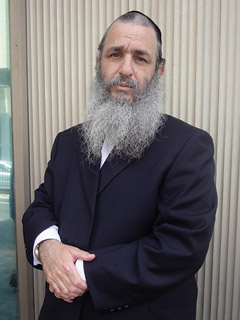 A few more minutes pass before Dudi Roth arrives. He’s dressed as an Orthodox man, clad from head to toe in heavy black cloth, which makes him look quite a bit older than his 51 years. Roth seems harried, and announces he has only a few minutes to sit with me. That made clear, he immediately launches into what I infer is his “stump speech.” It begins with a preamble about Dudi Zilberschlag, who founded Meir Panim fifteen years ago. The two men were friends, and about 11 years ago, Zilberschlag asked Roth if he would help run the organization.
A few more minutes pass before Dudi Roth arrives. He’s dressed as an Orthodox man, clad from head to toe in heavy black cloth, which makes him look quite a bit older than his 51 years. Roth seems harried, and announces he has only a few minutes to sit with me. That made clear, he immediately launches into what I infer is his “stump speech.” It begins with a preamble about Dudi Zilberschlag, who founded Meir Panim fifteen years ago. The two men were friends, and about 11 years ago, Zilberschlag asked Roth if he would help run the organization.
Roth was, at the time, living in Brooklyn, with his Israeli-born wife, Esther. He had a business selling electronic equipment such as televisions, stereos, and DVD players. “But we were not blessed with a family of our own, and after years of not having children, Esther says to me one day, she says, ‘let’s go back to Israel, where my family is.’”
 “We had 21 years of consultation with doctors that all ended in sorrow. There was no chance, absolutely no hope for us having children of our own,” Roth recalled, shaking his head sadly. “So, after being in Israel for a couple of years, we were about to adopt. My wife, though, wondered if we shouldn’t try one more time. We talked to our doctor, and he said it was a waste of time and money. But my wife was adamant. It was on shabbat that we finally found out the test results were positive. A miracle had befallen us! My wife, my Esther, was pregnant!”
“We had 21 years of consultation with doctors that all ended in sorrow. There was no chance, absolutely no hope for us having children of our own,” Roth recalled, shaking his head sadly. “So, after being in Israel for a couple of years, we were about to adopt. My wife, though, wondered if we shouldn’t try one more time. We talked to our doctor, and he said it was a waste of time and money. But my wife was adamant. It was on shabbat that we finally found out the test results were positive. A miracle had befallen us! My wife, my Esther, was pregnant!”
Befallen? His archaic choice of words only amplified how much Roth’s story sounded like one from Hebrew Scriptures, say, that of Abraham and Sarah?
“Here I thought all my prayers were answered, but then came the hardest part,” Roth continued. “It was September 18, 2001, and my wife, my dear, dear Esther, is diagnosed with preeclampsia.”
This, he explains, is when a pregnant woman develops high blood pressure and hypertension in her second or third trimester. Doctors advised if the baby was not taken out, either mother and child would die. Maybe both. Faced with such awful alternatives, Esther Roth underwent a Caesarian section in her 25th week of pregnancy.
“For hours I waited, praying with all my faith. Finally, I found out, my wife had survived, and I was the father of a girl! She was so small, she could have fit into the palm of my hand. How can I describe what I was feeling? Sorrow, panic, fright, hope. After decades of struggle to be parents, now it seemed like our problems were just beginning.”
“I made a promise to help each child in Israel — and, it didn’t matter if the child was Jewish, Christian or Arab.”
The baby girl weighted slightly more than one pound, and was given only a three-percent chance to live. She stayed in an ICU at the hospital for six months, at the end of which, the medical staff told Roth and his wife they should not try to take care of the child, and she should be institutionalized.
“They said we wouldn’t want her, she would be so deformed and mentally-impaired. Yet, today, she is 11 years old, and is completely normal. She gets 90 to 100 on all her tests, and other than for sniffles or minor cuts, she has never had to see a doctor again, since coming home. In some ways, she is smarter than her father. One thing is for sure. Her English is better’n mine! I don’t speak so good, ‘cuz I’ze originally from Brooklyn.”
I suspect this is a joke Roth has told many times before, but I grinned, obligingly.
“That is what made me get involved with Meir Panim. You see, we’d been blessed, my dear Esther and I, but there are still many more children who need help, children who through no fault of their own are born into bad circumstances. I made a promise to help each child in Israel — and, it didn’t matter if the child was Jewish, Christian or Arab.”
This promise, Roth acknowledges, has not been easy to keep. With the Israeli economy in such bad shape, it is exceedingly difficult to raise money. “In Israel, people don’t usually want to give shekels; they prefer to give value.” For instance, restaurants intentionally cook too much food, and donate the extra to soup kitchens. Food is the least of his costs, though. What’s more expensive is paying the rent and utility bills for the Meir Panim locations. “I can only do this, if I have strong partners,” he says. He then gestured towards the signs and plaques I’d noticed earlier.
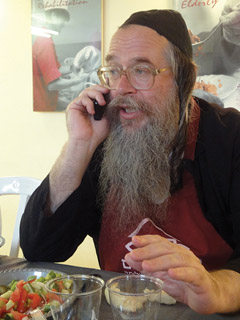 Aryeh Cohen arrives at the table. He runs this free restaurant, and it takes only a glance to see the job takes a heavy toll on him. Aryeh has a fretful air about him, with a forehead that is perpetually wrinkled with worry, and a posture that’s bent over by the psychological burdens he carries. Dressed in the same all-black ensemble as Roth, Aryeh’s coat and pants are not terribly clean, but splattered with food he’s been cooking already that morning. On his feet are a pair of well-worn black Nike sneakers. He has extra-luxuriant payes, which are the side curls of hair worn by Orthodox Jewish men. Aryeh’s payes dangle down to
Aryeh Cohen arrives at the table. He runs this free restaurant, and it takes only a glance to see the job takes a heavy toll on him. Aryeh has a fretful air about him, with a forehead that is perpetually wrinkled with worry, and a posture that’s bent over by the psychological burdens he carries. Dressed in the same all-black ensemble as Roth, Aryeh’s coat and pants are not terribly clean, but splattered with food he’s been cooking already that morning. On his feet are a pair of well-worn black Nike sneakers. He has extra-luxuriant payes, which are the side curls of hair worn by Orthodox Jewish men. Aryeh’s payes dangle down to
his waist.
Later I learn he immigrated to Israel (or made “aliyah”) nearly three decades ago from England, but his voice still carries the accent of his native Newcastle. He speaks very softly, so I must frequently ask him to repeat what he’s said. He now apologizes, nearly in a whisper, that he doesn’t have much time for me this morning. Some of his workers are exceedingly “rough boys,” he says, and today they are overly excited by young women in the kitchen.
As Aryeh rushes off, Roth explains there’s another problem today — namely, a surplus of volunteer workers. Two different families, one from Canada, another from the United States, will be showing up in an hour or so, to serve lunch as part of celebrations surrounding both a bar-mitzvah and a bat-mitzvah. These volunteers, of course, are in addition to the “rough boys” who are already making Aryeh’s day difficult.
No sooner has this been explained, than pandemonium erupts. The Straus family, all fifteen of them, have arrived early! They hail from Kew Gardens Hills, which is in Queens, New York, and have traveled to Israel to honor thirteen-year-old daughter, Michal.
Dudi Roth swings into action, greeting these visitors, and making them feel welcome. “Have you ever been inside a soup kitchen?” he asks Michal. The girl blushes and smiles, but doesn’t answer.
Undeterred, Roth continues joking. “Well, you are going to have to put on plastic gloves. I bet you’ve never done that before, either, have you?”
Soup kitchen proprietors are justifiably proud of how much food they serve. Yet, at the same time, they must
be saddened and ashamed that so many people would
go hungry otherwise.
As he leads the Straus family back to the kitchen, Aryeh says seventy-percent of the
people who show up at this free restaurant are senior citizens. Meir Panim also delivers meals to hundreds of house-bound seniors every day. He points out his dwindling store
of dehydrated soup packets. Not too long ago, he’d been given a mountain of boxes,
nearly 1,500 in total. Each carton contained over a hundred packets of dehydrated soup
in a variety of flavors made by the Knorr Company. Now, Aryeh says, he only had forty of these cartons left.
It is a peculiar thing about soup kitchens, this braggadocio about quantities and
numbers. Soup kitchen proprietors are justifiably proud of how much food they serve.
Yet, at the same time, they must be saddened and ashamed that so many people
would go hungry otherwise.
Aryeh gestures towards a series of enormous stainless steel sinks, where countless potatoes are soaking in clouded water. All need to be peeled and chopped, a daunting task which I tackle along with the Straus family. While we work, I talk with Avigail Straus, the mother. I can’t help but notice she appears confused about how to use the peeling tool Aryeh gave her.
“I brought my children here so they could see life is not all ‘No, I want sushi! We had Chinese last night!’” she says, in all seriousness. “We don’t see this sort of poverty in New York. Not where we live, at least. I always say, ‘there but for the grace of God….’”
I’ve heard this expression my whole life, and even used it more than a few times myself. Hearing it now, however, it struck me as heartless and absurd. Why is God showing grace to us, in New York City, but not to these poor people in Jerusalem? Why would God treat some people with more generosity than others?
Shouldn’t someone organize a Claims Conference on the Almighty?
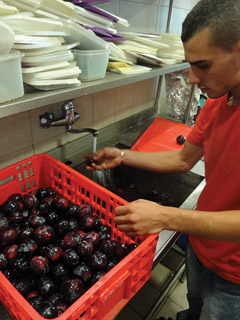 Such thoughts are pushed aside, however,
Such thoughts are pushed aside, however,
by the work of the next hour. Lunch today is roasted chicken, lamb goulash, potatoes, sauteed mushrooms, and rice. Aryeh told me about an organization called Lekot, which arranges to harvest any unpicked fruits or vegetables from various agricultural centers in Israel, and then distributes this produce to places like Meir Panim.
“Every Monday someone from Lekot will call and tell me what they’ve got, and it is delivered the next day,” he said. “This week, I got plums. Lots and lots of plums.”
Just before noon, people begin to filter inside. They choose their tables, groups of three or four senior citizens all clustered together, kibbitzing, as they wait to be served lunch. It is a hot August morning, and the restaurant’s interior has no air conditioning, so the front door is wide open. Buses headed in and out of Jerusalem’s Central Station roar past every few seconds, and an Israeli flag hanging there flaps and flutters in the commotion.
Because the dining area at Meir Panim is small, seating only forty or so at once, there is no fixed hour for lunch. Instead, people are free to come in whenever they like between 12:00 and 1:30 p.m. “I don’t like it to be all one go. I could not handle everyone we serve if they all came at once,” Aryeh said.
Like Varda Sohan, the manager in Tiberias, he knows the personal history for most of his regular clients.
“He’s an Arab!” Aryeh says, in a whisper, almost as if he’s embarrassed to speak the word. He’s pointing to a very dark-skinned man, who sits alone, and is sweating profusely as he eats. He’s so overheated, in fact, that a moment later he’s taken his shirt off, and is sitting bare-chested. After finishing his lunch, he pulls out plastic containers, and asks if they
can be filled up, too. “It’s food for his kids,” Aryeh explains. “His wife used to come in
here, but she was too picky and would only take the stuff she liked to eat. The children
were starving!”
About another woman, he observes, “She has three children, and all of them are autistic. Do you know what autism is in America?”
I assure him that, yes, sadly we know all about autism in America.
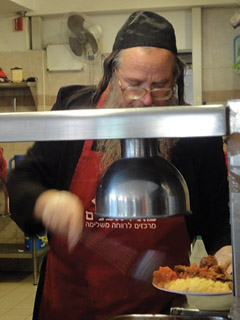 The station from where food is served is barely six feet wide. To prevent congestion, volunteers act as waiters and waitresses, and today it is the Straus family’s job to bring trays of food to the assembled guests. In honor of her bat mitzvah, Michal Straus is allowed to deliver the day’s first meal. As she walks towards an old man sitting alone in the corner, she carries the tray, and herself, with all the self-consciousness of a nervous girl who hopes to be invited to sit at the “cool kid’s” table in a junior high cafeteria. With a shy smile, she places a tray down in front of the elderly gentleman. He doesn’t acknowledge her presence, but begins to eat. His hands shake quite badly, with what appears to be Parkinson’s disease. While maneuvering the fork towards his open mouth, much of what he’d scooped up falls onto his shirt front.
The station from where food is served is barely six feet wide. To prevent congestion, volunteers act as waiters and waitresses, and today it is the Straus family’s job to bring trays of food to the assembled guests. In honor of her bat mitzvah, Michal Straus is allowed to deliver the day’s first meal. As she walks towards an old man sitting alone in the corner, she carries the tray, and herself, with all the self-consciousness of a nervous girl who hopes to be invited to sit at the “cool kid’s” table in a junior high cafeteria. With a shy smile, she places a tray down in front of the elderly gentleman. He doesn’t acknowledge her presence, but begins to eat. His hands shake quite badly, with what appears to be Parkinson’s disease. While maneuvering the fork towards his open mouth, much of what he’d scooped up falls onto his shirt front.
During the next two hours, more guests, and still more, continue to arrive. They shuffle into the restaurant, sit down, and plates full of goulash are placed down in front of them by Michal, as well as others of the Straus family. People eat, either not noticing, or not being interested, that these strangers are doing a “mitzvah” around them. I’d guessed their lack of response would discourage Michal, but I was wrong. She brings what must be her strong competitive streak to bear on even this task. She will deliver more trays, and smile at more hungry people than anyone else! No sooner does she drop off one tray, than she races back to the serving line to pick up another. Aryeh smiles fondly while observing her zeal.
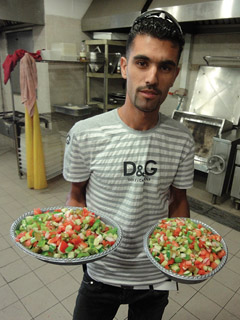 Things turn briefly weird when a guy comes in who appears both mentally-ill and drunk. He’s carrying many plastic bags, the rustling bustle of which adds to a swirl of chaos he creates around himself. His shirt is buttoned wildly out of sequence and is bunched up sideways across his chest. It looks as if he’s slept for many days, and maybe even urinated onto, the grimy pants he’s wearing. His sandals reveal toenails that are swollen with dirt and fungus.
Things turn briefly weird when a guy comes in who appears both mentally-ill and drunk. He’s carrying many plastic bags, the rustling bustle of which adds to a swirl of chaos he creates around himself. His shirt is buttoned wildly out of sequence and is bunched up sideways across his chest. It looks as if he’s slept for many days, and maybe even urinated onto, the grimy pants he’s wearing. His sandals reveal toenails that are swollen with dirt and fungus.
Dropping his many bags beside one of the tables, he brushes aside all offers of food, preferring to barge up to the serving line himself, where he grabs two plates of stew, and half a dozen slices of white bread. Returning to the table with these, he lays out three slices of bread. Carefully picking only meat out of the stew, he makes sandwiches with the lamb chunks, mooshing them closed with a hand so dirty, it leaves a shadowy imprint of filth on the bread’s surface. The guy shoves these moist sandwiches down into the bottom of one of his bundles.
“Aryeh! Aryeh! ARYEH!” he now began to scream.
Still behind the serving counter, dishing up food for others, Aryeh rushes out, a white plastic apron flying up about his waist. By gently squeezing the man’s arm, and whispering soothing words into his ear, Aryeh manages to calm this gentleman down, and even to make him giggle. He nods his head in agreement to something Aryeh has said. With exaggerated care, the man now picks up his bags, and makes his way out the front door.
“Dining with Dignity” is a slogan often used to describe the distinctive style of gastrophilanthropy practiced at Meir Panim’s free restaurants. Just how difficult it is to maintain decorum in such a setting is powerfully shown by the gale-force of crazy energy created by this one guy.
“I don’t need compliments on my cooking. I just want people to clean their plates.”
The lunch shift ends, and those few diners who remain come up to the serving line, and Aryeh scrapes the scant leftovers into their Tupperware containers, or even just plastic bags. He warned me it pains him deeply when anything goes uneaten, and I can see that’s true by how carefully he wields a spatula to coax every last drop of food from each pan. Nearly 300 people passed through Meir Panim today, Aryeh tells me, as he stands over the garbage can, looking at what did and did not get eaten. For that large of crowd, there are actually very few plate-scrapings here, though if the truth be told, the mushrooms were a wee bit salty and not to everyone’s liking.
“I don’t need compliments on my cooking. It’s not like I wish people would say, ‘Oh, this food is delicious!’ I just want people to clean their plates,” he says. “My father was from Poland, and was poorer than poor. I can’t stand to see any food go to waste.”
He suggests we have a cup of tea. He could now relax for a minute, but I sense that
Aryeh never truly relaxes. He seems perfectly content (or unaware) that he’s still wearing a white plastic apron, and rubberized gloves. Aryeh tells me he is 50 years old, and has ten children, two of whom now live in the United States. Before coming to work at Meir Panim, Aryeh studied the Torah full-time, and taught many students. Did he miss doing this all
day, I ask? Wouldn’t he prefer to be studying and teaching, rather than working here at
Meir Panim?
After thinking this over for a moment, he tells me how easily discouraged and angry his Torah students would become. “‘I don’t understand! I’ll never understand,’ they would cry.” Aryeh would have to stop, and back up to the point where he had lost them. “O.K. you get this, right?’” he’d say before moving on. “And, then, you understand this, yes?”
He continued, “each step builds on the next, until they are well past the point where they got confused just a few minutes earlier. It’s about patience. If a child sees you are not being patient with them, they will never understand.”
We hear a whoop of laughter from the kitchen. When Aryeh looks up, he sees a pretty young girl is once again being the cause of flirtation and distraction for some of his
young criminals.
“These boys … They didn’t get good treatment at home. They never learned how to keep themselves out of trouble.”
He now frowns and, to my surprise, mentions Avigail Straus, the mother from Queens,
New York. Earlier, he’d handed her a peeling tool, and asked if she’d start working on the potatoes. “But she didn’t know how! How is it possible a woman her age would not know how to peel a potato?”
Before I could answer, Aryeh offers his own theory.
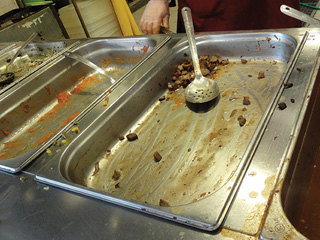 “I guess she’s probably rich enough, she has some machine that does it for her. Bzzzt! Bzzzzt!” Aryeh was imitating the whirring sound of the blades on this fantastical appliance.
“I guess she’s probably rich enough, she has some machine that does it for her. Bzzzt! Bzzzzt!” Aryeh was imitating the whirring sound of the blades on this fantastical appliance.
No, I assured him. Other explanations were more likely. Avigail Straus had a servant to do such kitchen chores for her.
Or, she never cooked at all, preferring the ease of restaurants and frozen entrees heated up in a microwave. Or, maybe she was so nervous about gaining weight, that she never ate carbs.
“Carbs?” Aryeh asked, his brow knotted with worry. “What are those?”
“Carbohydrates. Like in pasta, or bread, or potatoes.”
“There are many Americans who never eat potatoes or bread?”
“Many,” I said. “Especially if they are rich.”
Aryeh stared at me, dumbfounded. It was as if I’d divulged that many Americans
are vampires.



